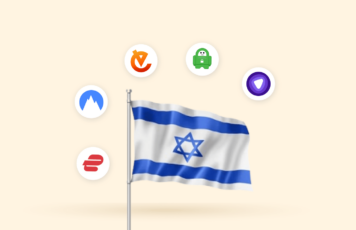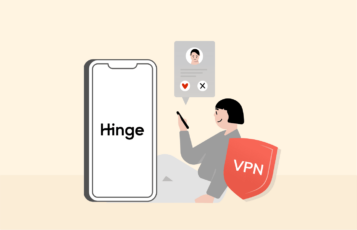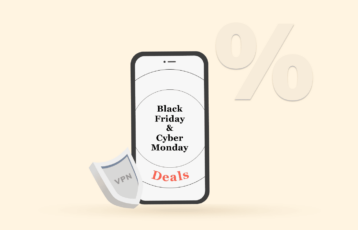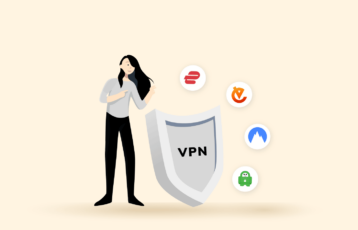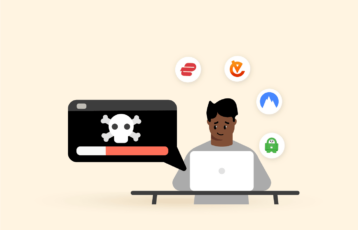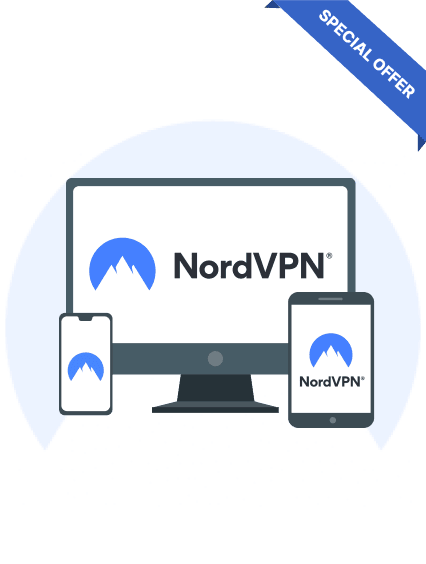Almost all VPNs work by encrypting your traffic and routing it through secure servers before it reaches its destination. So, even if your connection is intercepted, the traffic will seem to originate from the VPN server rather than your device. But doing so gives the VPN provider almost complete control of your online activities, with nothing to stop them from logging your data and recording your activities. Therefore, you must choose a VPN with a no-logs policy if you value your privacy.
But how do you find a reliable no-logs VPN, we hear you ask? We thoroughly researched over 50 services to pick the top 10 VPNs with a valid zero-logs policy. Let’s take a look at these providers through this guide.
Short on time right now? These are the top 3 log-less VPNs
- NordVPN – Strong emphasis on privacy and security, budget-friendly, 30-day money-back guarantee.
- Proton VPN – Our top recommended VPN service for strict no-logs policy, fast speed servers, robust security, and incredible unblocking capability.
- Private Internet Access (PIA) – Double encryption mode, automatic kill switch, does not keep logs of users’ data, largest server network.
What is a zero-logs VPN?
Is there an utterly zero-logs VPN? It is a very controversial question with varied answers. For example, can a VPN service provider be truly zero-logs if it stores logs for a few minutes before deleting them? Or else, what about keeping data on bandwidth and timestamps and not identifiable information like IP addresses? Also, do aggregate and anonymized usage data count as logs?
These are some critical questions you should ask yourself when choosing a VPN. Dig deeper into its privacy policy to see whether it is a genuinely no-logs policy. Some providers have undergone independent audits by reputable firms to verify the no-logs policy. For example, ExpressVPN recently published its audit with the renowned cybersecurity firm Cure53.
Advantages of anonymous VPNs
Without a VPN (Virtual Private Network), your internet service provider can see and record users’ online activities. However, a VPN will encrypt your traffic and route it through protected servers. As a result, it will shield your ISP from accessing your private information and what you do on the internet.
While the VPN will protect you from your ISP and other third parties, the provider will see your information instead. That also includes identifiable data such as your IP address, the web pages you visit, and more.
Fortunately, many providers guarantee to protect your privacy, unlike ISPs that must surrender logs to government authorities. However, you can only trust a no-log VPN to maintain security. That is because there will be no information to hand over when push comes to shove.
What makes a good private VPN?
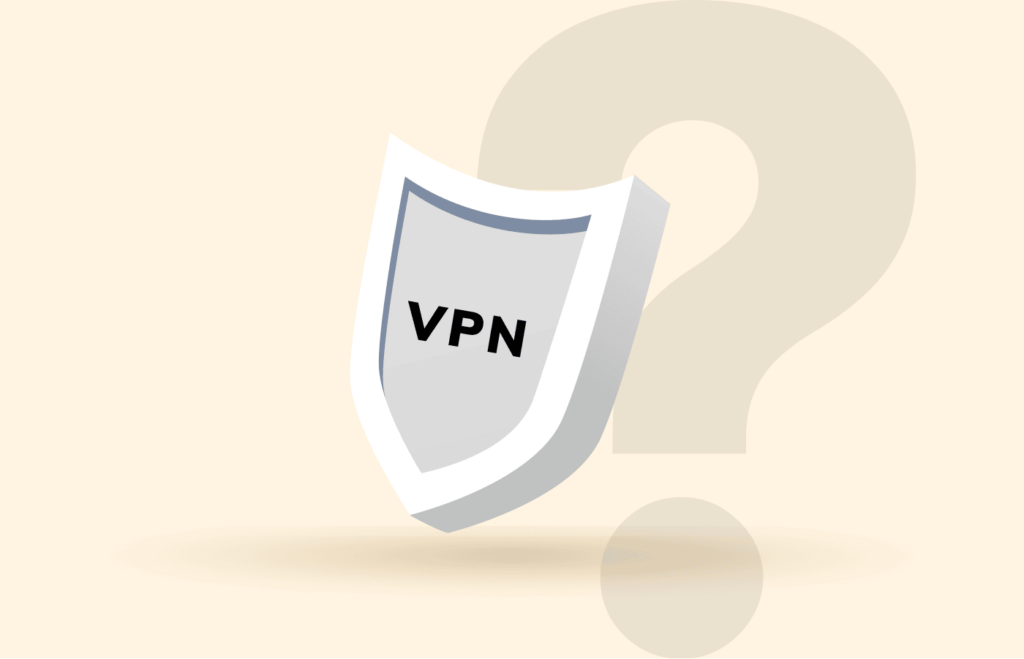
It is not guaranteed that a VPN will not keep logs. However, there are certain things you should look out for to determine whether the VPN will maintain your privacy.
Torrenting policy
The torrenting policy is an excellent way to know if a VPN is genuinely zero-log. If you use a VPN to download or share copyrighted material, a copyright troll can notice and take action. It can be in the form of a DMCA takedown request or settlement letter.
Depending on its jurisdiction, the VPN can be legally obligated to forward these requests and letters to the user. But if the provider does not keep logs, it won’t know who to deliver to. To understand how to stay under the radar, check out our best VPNs for torrenting.
Leak protection
Even a service with the strictest no-logs policy can experience downtimes that can easily expose your data and identity. Therefore, the kill switch is one of the most crucial features to consider when choosing a VPN. It will automatically cut your connection until the VPN connection resumes.
When you open a webpage, your browser will send a DNS request to change the domain to a numerical IP address. These requests can sometimes reroute outside the encrypted tunnel and pass through your ISP’s servers instead. That means your ISP will easily see the websites you are visiting. So, you must choose a VPN with IP and DNS leak protection. It ensures that your DNS requests never go through your ISP’s private servers.
However, sometimes, the DNS leak protection may fail to work. For example, Windows 10 devices stop IPv6 DNS requests from routing through unencrypted networks. The easiest way to resolve this issue is to disable the IPv6 in your device’s settings.
Shared IP addresses
Most VPN services now embrace shared IPs, where multiple users (sometimes more than 100) use the same IP address. When you connect to a server, the IP address assigned to you will also be given to other users. As a result, tracing particular activities to a single person won’t be easy, thus increasing your privacy.
Some VPN services also use dynamic IP addresses where the shared IPs change frequently. Besides strengthening your privacy, these shared IP addresses are cheaper for the VPN provider to maintain, a win-win solution.
A few VPNs also offer dedicated IPs reserved for a single user. That means you will get a particular IP address when accessing the Internet that no one else can use. The disadvantage is that it is effortless to trace your activities and location. However, it can help access banking sites that need a specific IP address.
Physical servers
Most VPNs on this guide own physical server hardware, giving them maximum access control. However, some VPNs try to reduce the cost by using virtual servers. Unfortunately, that is a significant disadvantage as it is easy to intercept the connection and capture metadata and traffic.
If you are concerned about your privacy, go for a VPN with its own physical servers. Renting servers could allow malicious actors to install backdoors or steal user information.
Some providers, such as NordVPN, use a technology that allows servers to run only on RAM. Since it cannot store data, your information will not remain on the servers after your session ends.
Encryption
Although imperative, the no-logs policy shouldn’t be the only consideration on your list. After all, the primary purpose of a VPN is to facilitate a secure connection with minimal risks. Therefore, consider features such as AES 256-bit encryption that contribute to your safety. Other security features include double VPN, obfuscation, perfect forward secrecy, etc.
Best no-logs VPNs today – Detailed list
1. NordVPN

The best no-logs VPN that has been audited and tested for keeping zero user logs. Based in Panama, a privacy-friendly region, the provider has also set up a RAM-only server network to ensure keeping no logs.
Pros
- Offers obfuscated servers
- Super fast servers
- Unblocks streaming sites
Cons
- Clumsy desktop application
NordVPN is a top truly anonymous VPN. It offers the best value for money with high-speed servers and can unblock any geo-block on its way.
Does NordVPN keep logs? We hear you ask. The provider has a strict no-logs policy, which means it does not store any of your identifiable information. In addition, it has undergone independent audits by VerSprite and PricewaterhouseCoopers AG (PwC) to verify the zero-logs claims. You can download and read the audit reports yourself, which is a show of transparency.
Besides, it is based in Panama, not part of the Fourteen Eyes alliance. Panama is privacy-friendly and does not have laws that force companies to retain user information so that you will be safe.
Is NordVPN fast enough? Yes, it even trounced the rest to emerge as winners in our recently concluded top VPN speed test. The Quick Connect feature makes it easy to use service as it will automatically connect you to the fastest server. You can try to connect manually to a nearby server if you can’t find desirable speeds with the auto-connect feature.
NordVPN has worldwide coverage of more than 6,800 servers in 113 countries. It operates multiple servers in each country, with the majority in the US. That makes it easy to unblock geo-blocked content and services from virtually anywhere. The good news is that the company continues to improve its infrastructure. For example, it now operates RAM-based servers, automatically deleting your data after logging out.
The VPN has shared IPs, which offers additional anonymity. When you connect to a server, you get the same IPs as other users. Since the IP address does not belong to a single person, finding you won’t be easy.
It allows you to buy a static IP address alongside the other servers. A static IP address means you will use the same address with all your VPN connections. The most significant advantage is that you can unblock content from a particular country even if other IPs fail. In addition, since you will be using the IP address alone, streaming services will not flag your connection. However, on the downside, it is unsuitable for privacy as it will link back to you.
NordVPN is compatible with the Tor network and has an inbuilt Onion over VPN functionality. It adds privacy by routing your traffic through the Onion network after leaving the VPN server. Moreover, you can access the Onion sites safely with any browser without opening Tor.
It is the best VPN option for unblocking geo-blocked content from anywhere. Its SmartPlay feature bypasses the geo-restrictions of several streaming sites, such as Hulu, JioCinema, and ABC iView.
In addition, you will access all the major Netflix libraries, including the US, Canada, Australia, the UK, and Japan. The provider also works well with Kodi if you prefer to use it to stream your favorite content.
Are social media sites blocked in your region, workplace, or school? NordVPN also unblocks all the major platforms, such as Instagram, Facebook, Twitter, and more.
It allows unrestricted P2P sharing through BitTorrent or any other torrenting client. Since each server has unlimited bandwidth and data, you will torrent without worrying about restrictive data allowance.
Furthermore, it has optimized hundreds of its servers for improved speeds and security. It also offers SOCKS5 proxies so that you can enjoy faster torrenting speeds. Besides, thanks to its no-logs policy, it does not retain your torrenting activities.
NordVPN security standards go above and beyond the needs of an average user. First, it uses AES 256-bit encryption to safeguard your data and connections. Then, it combines encryption with a 2048-bit DH key and SHA2-384 authentication. The DH key is the cipher that encrypts and decrypts your data. On the other hand, authentication helps to ensure that your data packets reach the correct server successfully. This feature prevents hackers from intercepting or rerouting your traffic to another server.
The Perfect Forward Secrecy (PFS) is another crucial NordVPN security feature. It will assign you a new encryption key every time you start a session to make you look like a new user. Also, it deletes any data and activities of your current session, thus keeping it unrelated to your next session.
If you use macOS and iOS devices, IKEv2/IPSec is the default protocol, with the option to switch to OpenVPN. However, only the OpenVPN option is available for Android and Windows. In addition, the company has recently introduced the NordLynx protocol, which offers double the speed of the other protocols. It is an extension of the Wireguard protocol hailed for its simplicity and efficiency.
The automatic kill switch is one of the best ways to stay secure when using a VPN. If the VPN connection drops, it will prevent traffic from leaving your device to prevent leakage. It is automatically enabled on mobile applications, but you must enable it manually on the desktop client.
NordVPN allows you to choose the apps the kill switch will block. So, if the VPN connection gets compromised, only risky apps will be blocked while your internet connection remains intact.
NordVPN offers greater anonymity than other vendors. Its Double VPN feature passes your connection through two servers in separate locations rather than one server, making it extremely difficult to trace users’ online activities.
Would you like to upload your files to the cloud securely? The NordLocker will scramble your files before you upload or share them on the cloud. However, only people with NordLocker can decrypt the file, which helps to reduce man-in-the-middle attacks. The best part is that you will get up to 5GB of free data when you sign up for the NordLocker package.
You can connect up to 10 six simultaneous devices on a single subscription. That includes your smartphone, laptop, PC, tablet, or any other compatible with a VPN. Remember to install it on your router to enjoy unlimited simultaneous connections. Fortunately, the service works well with Android, Windows, iOS, and macOS operating systems.
Does NordVPN have good value for money? Despite all these high-end features, NordVPN is incredibly affordable. You can opt for the monthly plan, which is pricier at $12.99. However, the price falls significantly to $4.99 for the annual plan. The two-year plan is the best deal at $3.99, representing a 51% discount. All the plans come with a 30-day money-back guarantee, so you can try the service risk-free.
2. Proton VPN

This Swiss-based VPN backs its no-logs policy via its neutral jurisdiction and strong protection of its bare-metal servers.
Pros
- Transparent privacy policy
- Anonymous payment methods
- Unblock streaming sites
Cons
- Sluggish email support
Proton VPN is another VPN with the best zero-logs policy. It also boasts fast speeds, adept unblocking capability, and unlimited data.
It is based in Switzerland, known for its strong privacy laws. The VPN cannot save user connection logs or other identifiable information, and it cannot be compelled to conduct targeted logging on its users. We dug deeper into its privacy policy and discovered that the service does not keep traffic logs, which makes you completely anonymous.
The VPN has an impressive collection of security features for your online safety. First, it uses AES-256 encryption with a 2048-bit RSA key and perfect forward secrecy. In terms of protocol, OpenVPN is the only option on desktop apps. This is disappointing as many providers are adopting the latest faster WireGuard protocol. Mobile apps allow you to switch to the faster but less secure alternative IKEv2.
ProtonVPN excels at unblocking geo-blocked content. On several servers, we easily bypassed Netflix US’s geo-restrictions. It also works well with streaming services such as Channel 4, Disney Plus, and CTV.
It has a free version with no bandwidth caps and offers three paid plans. The free version allows only one connection, three server locations, and medium speeds. To get more features, upgrade to the basic, plus, or visionary plans.
3. Private Internet Access (PIA)
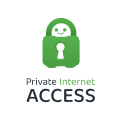
While it’s based in the USA, PIA VPN still ensures users’ privacy with a robust no-logs policy that has been tested via court summons.
Pros
- Ensures robust online security
- Generous simultaneous connections
- Unblocks major geo-restricted streaming platforms
Cons
- Based in the United States
Private Internet Access (PIA) is a lightweight and highly customizable zero-logs VPN. It offers decent speeds, excellent security, and unblocks content in many locations.
One thing that will impress you with PIA is its zero-logs policy. The provider is based in the US and should abide by US laws and demands. For example, it must hand over any user information if the government requests it. The US also falls under the 5/9/14 Eyes Alliance jurisdiction and shares intelligence information with other countries. However, don’t worry; the company does not gather traffic logs or VPN/proxy usage details.
Several instances have shown that PIA follows its no-logs policy. For example, in 2015 and 2017, it was requested to produce log data for an ongoing investigation. However, the company had no information to hand over on either occasion. Verifying a VPN no-log claim is difficult, but the two instances make PIA a truly private VPN.
PIA will email your username and password when you sign up. It is separate from the one you used to create your account. Although it may be a bit inconvenient, it adds an encrypted layer.
PIA uses the latest security features that can be significantly customized. The AES 128-bit encryption is the default, but you can remove it (not recommended) or upgrade it to 256-bit. Although most VPNs use 256-bit AES, 128-bit is still secure and takes less toll on performance.
In addition, OpenVPN UDP is the default protocol, but you can switch to OpenVPN TCP, PPTP, or L2TP/IPSec. It also offers the WireGuard protocol, which is lightweight and faster than others.
The provider offers split tunneling on the desktop apps. This feature lets you decide which applications to pass through the VPN and which to use directly. For instance, you can encrypt your banking data or torrent traffic and browse the web outside the encrypted tunnel.
PIA’s ad blocker is dubbed MACE, and you can easily turn it on in the settings. It will effectively block ads, trackers, and malware to protect your connections. This feature is available on Windows, Android, macOS, and Linux but not iOS. We tested the ad blocker on YouTube, and it successfully blocked all the ads.
Can PIA bypass the Great Firewall of China? This is a robust firewall that many VPNs struggle to circumvent. Unfortunately, PIA does not currently work in China. However, it has plenty of servers closer to China in places such as Hong Kong, Taiwan, Mongolia, and India.
PIA has native Windows, Android, Mac, Linux, and iOS clients. The features are uniform in all the apps except for the iOS application. It has no MACE feature and can only use the IPsec protocol without switching to OpenVPN. You will also get Chrome, Opera, and Firefox secure browser extensions. The most significant advantage is that it allows you to connect up to unlimited simultaneous devices.
Besides, it offers 24/7 live chat support to users. Moreover, its help section has many resources, such as easy-to-follow tutorials, a searchable knowledge base, and troubleshooting tips. You can also seek answers in the FAQ section, which covers some of the common issues associated with the service.
The highlight of the service is the user-friendly interface on all the apps. Getting started is easy, as you will only need to input the login credentials you received. After logging in, use the big power button in the middle of the screen to connect to the fastest server available. The server list interface is also intuitive, making it very easy to connect to the servers manually. It shows the ping times on each server location so you can know which server to use.
PIA quotes its monthly plan at $9.95. However, the yearly plan cuts the price significantly to only $3.33. The icing on the cake is the 2-year plan, which is available at $2.69, a 77% savings. If you ask within 30 days, you will get a full refund of your money. This allows you to test the service risk-free.
4. ExpressVPN

This veteran BVI-based VPN is known for ensuring users’ security and anonymity. It has a rigid no-logs policy since beginning, which it now has jazzed up with a RAM-only network.
Pros
- Ensures blazing fast speeds with stable connectivity
- Easily bypasses geo-blocks
- Reliable customer support
Cons
- Slightly pricier than its rivals
ExpressVPN is a popular VPN with a truly no-logs policy. To verify its no-logs claims, it has undergone independent audits by renowned audit firm PricewaterhouseCoopers (PwC) and reputable cybersecurity company Cure53.
The only data the company stores is the information you provide when signing up, like your email and payment information. You can even pay with cryptocurrency if you require more privacy since the transaction will not be traceable. Also, you can create a new email account instead of your personal email address.
ExpressVPN has TrustedServer technology for improved security. It ensures that the servers run on RAM and cannot store data.
The VPN uses AES 256-bit encryption on every connection to ensure no one will tamper with your information. On top of the stealthy protection, it employs 4096-bit encryption, SHA-512 HMAC authentication, and perfect forward secrecy for additional security.
ExpressVPN offers multiple protocols. It has made OpenVPN UDP the default, but depending on your connection, you can also opt for OpenVPN TCP, L2TP/IPsec, and PPTP. (Want to know more? Check out our VPN protocols guide.)
The Network Lock feature (kill switch) will secure your data. If the VPN stops, it temporarily prevents traffic from leaving the encrypted tunnel. This feature is enabled by default, so you won’t need to configure it manually.
In addition, our tests proved that ExpressVPN does not leak DNS, IPv6, or WebRTC leaks.
It operates more than 3,000 servers dispersed in over 105 countries. That makes it easy to access content and services from anywhere worldwide. In addition, many locations have multiple servers with the best US and UK coverage.
Does ExpressVPN offer sufficient speeds? It is one of the fastest VPNs on the market, and the drop in your speeds will be barely noticeable — thanks to its proprietary protocol, “Lightway.” It offers double the speed that the OpenVPN protocol offers. The servers offered consistent speeds across all locations we tested.
ExpressVPN’s logging policy does not store identifiable information, such as IP address or connection timestamps. It only keeps the location you connect to (not specific servers), dates (not time), and daily data usage. That is only for diagnostic purposes and cannot be traced back to you. Moreover, the company is based in the British Virgin Islands, which has friendly privacy laws.
The Smart Location feature will give you the fastest connection. It measures your speed, latency, and distance to connect you to the fastest server every time. You can always manually connect to another server if you experience slow speeds or your connection is blocked.
Can ExpressVPN unblock Netflix? Yes. We tested ExpressVPN with several Netflix libraries, including the US, the UK, and Japan. It was a success, and we could stream in HD without buffering. It also unblocks other major streaming such as Indian Zee5, Canadian CuriosityStream, and Brazilian Globo. Does your school or workplace administrator block YouTube, TikTok, and social media platforms? ExpressVPN is also reliable for unblocking these sites.
The VPN service provider supports P2P sharing. With its superfast speeds and unrestricted bandwidth, you can torrent unrestrictedly across its entire server network.
It works well with all operating systems. However, if you want the full functionality of the VPN, go for the desktop clients (Windows and macOS). Its mobile VPN apps (Android and iOS) lack important features like Tor compatibility and IP leak protection. Fortunately, it allows you to connect up to 8 devices simultaneously.
ExpressVPN is compatible with a wide range of routers. It means you can install it on your router to add more simultaneous connections. This includes devices that don’t support VPN software, such as smart TVs, Xbox, and PS4 consoles.
Can ExpressVPN bypass the Great Firewall of China? The Chinese government uses the firewall to block access to certain websites such as Google, YouTube, and Twitter. It is very powerful, and many VPNs cannot circumvent it, but ExpressVPN can. This China VPN has an obfuscation feature to conceal your activities.
The pricing structure is straightforward, with only three plans with the same premium features. Although ExpressVPN is pricier than its competitors, it is more affordable, with bigger discounts on the longer plans. The service supports a long list of payment methods, including Bitcoin.
5. Surfshark

Surfshark excels at ensuring user privacy with audited no-logs policy. Despite its Dutch base, it’s RAM-only server network strengthens the company’s stance on users’ privacy.
Pros
- Offers smooth connectivity
- Unblocks streaming sites
- Impressive cross-platform compatibility
Cons
- Customer support could be better
Surfshark is a newbie in the VPN industry that is rapidly growing and competing with bigwigs like ExpressVPN and NordVPN. It boasts an impressive list of unique features, works in almost any location, and is cheaper.
Regardless of the server you connect to, you can stream content in the 4K definition without issues. Use servers closer to your location for faster speeds. It is worth noting that many factors can affect your speed. So, you might see inconsistencies in speeds depending on your base internet speed.
Surfshark’s zero-logs policy states that the provider does not collect identifiable data like session information, browsing history, or IP address. The company only stores your email address and basic billing information. You can create a new email address instead of using your personal one and pay anonymously with cryptocurrency.
Furthermore, the service also gathers diagnostic reports and analytics information on the application. For example, it collects your location data when you use the ‘Auto-Connect‘ feature. Although this information is not shared with third parties, you can disable it in the settings menu.
The provider is based in The Netherlands. While this country is a member of the 14 Eyes Alliance, Surfshark cannot be forced to share user information as it logs none. The provider has gone a step further to provide a warrant canary. You can determine whether the company has received any court orders. Interestingly, the provider updates it daily to keep you in the loop.
Interestingly, the VPN recently validated its no-logs policy claim through an independent audit by Deloitte. Before that, cybersecurity firm Cure53 audited its Chrome and Firefox extensions for security.
Surfshark also comes with a practical automatic kill switch. It will temporarily hold your internet traffic if the VPN connection gets compromised. However, the feature is not activated by default, so you must switch it on manually.
Another feature that prevents leaks is DNS leak protection. Your ISP can see your internet activity if your DNS requests leak. Surfshark has private DNS on every server to prevent this from happening. Besides DNS leaks, the provider prevents IPv4, IPv6, and WebRTC leaks.
It uses 256-bit AES encryption, which is nearly impenetrable. It is the same encryption standard governments and militaries use to protect sensitive information. So, your ISP and other third parties will not see what you are doing online.
Two-factor authentication (2FA) is another excellent security feature. Instead of relying only on a password to log in, 2FA offers a temporary code. It helps to ensure that no one else can access your account.
Surfshark’s MultiHop feature allows you to double your encryption by routing traffic through two servers. It may not be helpful for regular users, but you can use it if you are concerned about your security. However, remember that the feature can potentially lower your speeds.
The VPN runs RAM-only servers that automatically delete all your data when you end a session. That means you will start the next session on a clean slate. So, even if a hacker manages to intercept your connection, there will be no data to steal.
It allows you to choose from four VPN protocols to protect your connections: IKEv2, OpenVPN UDP/TCP, WireGuard, and Shadowsocks. Depending on your connection, the VPN client will automatically detect the right one.
Sursfshark provides fast and consistent speeds for all kinds of activities. The auto-connect feature will connect you to the fastest server, and the drop in your speed will be minuscule. Furthermore, when manually connecting to international servers, you will still get similar results.
The provider has a decent-sized network with over 3,200 servers in 100 locations. Most are spread across 24 US locations, so accessing US geo-blocked content will be easy. It also has a bigger coverage in Europe, Australia, Canada, and India.
It also has physical servers in countries with strict internet censorship, such as Vietnam, Russia, and Turkey. You can activate the Camouflage Mode to hide the fact that you are encrypting your traffic with a VPN. The feature uses a technology that makes your VPN traffic look normal.
Moreover, Surfshark provides static IP servers. Unlike other servers where you get a random IP address, the static servers will offer a fixed one. That means you will have the same address every time you connect. Although the static IP may not be suitable for optimum privacy, it is helpful for secure sites like PayPal.
Besides, it will eliminate the need to complete unending CAPTCHA checks. The static servers are available in Japan, Germany, Singapore, Germany, and the UK.
The CleanWeb feature is Surfshark’s in-built ad blocker. We tested it with YouTube, and it successfully blocked the annoying ads. This feature will protect you from malicious trackers and malware that might compromise your security and privacy.
All its servers allow P2P sharing, although it is difficult to identify the optimized ones. Use nearby servers to get better download speeds and share torrent files without buffering. Take advantage of the unlimited bandwidth and data to torrent large files. In addition, it works well with popular P2P clients such as uTorrent, BitTorrent, Vuze, etc.
Surfshark has native Android, Windows, macOS, Android, Fire devices, and Linux VPN apps. Although there are slight layout differences, all the applications are easy to navigate. You can also install the app on your router to use it on devices that don’t work with a VPN. Luckily, it does not limit the number of devices you can connect to.
It has a simple pricing structure with only three plans. The monthly plan is priced higher, but longer plans offer bigger discounts. In addition, Surshark allows you to test the features risk-free with a 30-day money-back guarantee.
6. PrivateVPN

A modest VPN provider that doesn’t fail to prioritize users’ privacy. Hence, it keeps no-logs and collects minimal information required only for operational purposes.
Pros
- Does not keep identifiable information
- Support torrenting
- Fast VPN service
Cons
- Kill switch is only available on Windows
PrivateVPN may not be as fancy as its competitors, but it has a strict no-logs policy. Its ability to unblock geo-blocked content and reliable connections make it ideal for streaming. Although there are few servers, they are powerful enough to handle any task.
The VPN is incorporated in Sweden, a member of the 14-Eyes Alliance. This means it can be forced to store user logs and even hand them over to authorities. However, PrivateVPN is committed to a zero-logs policy to protect your privacy and security. According to the policy, it does not collect any traffic logs or other identifiable information.
It is very easy to get started with PrivateVPN. For example, when you click on the current location, a separate window with a list of the other server locations will pop up. Each location shows the ping time, so you can always connect to the fastest server.
PrivateVPN is an excellent option for streaming. It makes the process user-friendly by labeling specialized servers for streaming specific sites. While the other servers could not bypass Netflix’s restriction, the labeled servers did it successfully. The provider also works with other streaming services, such as ITV Hub, Amazon Prime Video, and Hulu.
It supports P2P sharing activities. The VPN allows unlimited bandwidth, so you will not need to worry about data restrictions even when downloading large files. Port forwarding is also available, enabling you to access more peers and, thus, more content to download.
The service offers several customization options for data security. First, you can choose between 128-bit or 256-bit encryption, both unbreakable. While 256-bit is more powerful, 128-bit is lightweight and faster. The service pairs the encryption with SHA256 authentication alongside 2048-bit RSA keys. Multiple protocols are available, but it will depend on the device you are using.
PrivateVPN is affordable, with the monthly plan starting at $8.10. The price will plummet to $5.03 if you pay for the 3-month plan upfront. Get the best value with the two-year plan at $2.07. The VPN guarantees a full refund within 30 days if you are unsatisfied with the service.
7. CyberGhost

This beginner-friendly service provider ensures top-notch user privacy by practicing a strict no-logs policy. Based in Romania, it doesn’t have to comply with any mandatory data-logging laws.
Pros
- Offers a 24-hour free trial without registration
- Makes it easy to unblock geo-blocked content
- Robust privacy and security
Cons
- No apps for routers
CyberGhost is among the best VPNs for stealthy security. It has a robust network with easy-to-use apps and a generous money-back guarantee
The VPN keeps a strict no-logs policy. This means it does not collect information that can be traced back to you. However, it gathers a fair amount of non-identifiable data for analytics purposes. This includes connection attempts but not timestamps, IP address, VPN server, or user ID.
You can even pay anonymously through Bitcoin. However, we discovered that the provider keeps some hardware information to monitor the simultaneous connections. Don’t worry, as this cannot compromise your security and privacy.
Romania, where CyberGhost headquarters are based, is privacy-friendly and not part of the 14 Eyes countries. This means it is not obligated to hand over your information to government agencies.
The company has not been audited recently but routinely conducts independent testing on its security processes. In addition, it issues a transparency report every three months to provide information on infrastructural improvements and malware activity flags. Nonetheless, the VPN should still perform audits on its zero-logs policy.
CyberGhost has a massive network of 9500+ servers with great coverage in 91 countries. It runs servers even in highly restricted countries such as Turkey, Qatar, Russia, and Saudi Arabia. The more the server, the higher the chances of getting better speeds and unblocking content from any region.
Fortunately, it uses RAM-based servers that can’t store anything.
Besides, you should try the NoSpy servers if you need maximum security, although at an extra cost. These servers are based in the company’s private data center, attended by a specialized team. Since no third party is involved, it eliminates the risks of a man-in-the-middle attack. The NoSpy package also includes dedicated uplinks and premium hardware.
CyberGhost also offers virtual servers that are not in the indicated country. For example, a server can be specified in the UK, but it is not there; it is somewhere else. The advantage of these servers is that they offer faster and more reliable connections and work well in countries that restrict VPN usage.
However, these servers can raise pertinent security concerns. For instance, a server can be located in a 14-Eyes Alliance country yet indicated in a safe country.
Does CyberGhost unblock content? Yes, it is powerful enough to bypass the geo-restrictions of all major streaming services. The service reliably unblocks AMC, Netflix, Sling TV, DAZN, Fox Sports Go, and more.
It has specialized streaming-optimized servers for better speeds. The company recycles the IPs regularly, so streaming services are unlikely to block your connections.
Also, the gaming-optimized servers improve the gaming experience. However, they didn’t work during our testing but instead produced a high ping rate. You can use nearby servers if you want faster speeds for gaming.
While many VPNs guarantee superior security, only a few do. CyberGhost uses AES 256-bit encryption to protect your connections from third parties, such as your ISP, coupled with 2048-bit RSA keys, SHA256 authentication, and perfect forward secrecy.
CyberGhost offers multiple connection protocols, including WireGuard, OpenVPN UDP/TCP, and IKEv2. Although the VPN client will automatically choose the most optimal protocol, you can select the one you prefer.
WireGuard is the latest VPN protocol that trounces the others in terms of speed. However, using it may be unsafe as it assigns static rather than dynamic IPs. This means you will use the same IP address every time you connect, which raises privacy concerns. CyberGhost combines RESTful API with an RSA-certificated daemon that assigns dynamic IPs to keep you safe.
All CyberGhost applications come with an automatic kill switch. On top of that, it also has built-in DNS/IPv6 leak protection in both the apps and browser extensions.
You can set the desktop and mobile apps to launch automatically when using a public Wi-Fi hotspot. In addition, it can be set to ask whether to connect to or ignore specific networks. This is highly convenient and eliminates the hassle of turning the VPN client on.
CyberGhost works well with Tor. Use the Onion over VPN setup by first connecting to the VPN server and then launching the Tor network. This will give you an extra layer of security and anonymity but may slow your speeds slightly.
It has P2P-optimized servers, making it an excellent choice for torrenting. These servers offer high speeds while maintaining your security and anonymity. You can easily access the servers under the ‘for torrenting’ tab to share and download files easily.
The VPN works on all popular operating systems. It has easy-to-use Windows, macOS, Linux, Android, iOS, and Amazon Fire TV applications. A single plan allows you to connect up to seven simultaneous devices. There is also a free browser extension, although it is insecure, unable to bypass geo-blocks, and connects to only four locations.
8. IPVanish

While it’s based in the US, this service provider practices and strengthens its no-logs policy (independently audited) by setting up a strong infrastructure.
Pros
- Committed to its no-logs policy
- Decent speeds
- Does not limit the number of connections
Cons
- Lacks split tunneling
IPVanish has an impressive list of privacy and security features, making it the best anonymous VPN. It will hide your IP address, secure your connections, and unblock streaming sites
The VPN has a strict no-logs policy and does not keep the traffic, connection, or other activity data. However, the provider collects unidentifiable information to monitor site activity and improve functionality.
It is also important to note that IPVanish is based in the United States, which is a member of the 5-Eyes Alliance. That means the government can summon the company to hand over user information. However, you shouldn’t worry; the company has new management that guarantees zero logs.
IPvanish uses rock-solid AES 256-bit encryption to ensure your safety. Additional security features include DH-RSA 2048 key exchange, SHA512 authentication, and perfect forward secrecy. The combinations of all these features are virtually unbreakable, and no one will get their hand on your private information.
The automatic kill switch reduces the chances of accidental exposure of your data and online activities by stopping the traffic flow if the VPN connection disconnects. It is disappointing that IPvanish only offers this helpful feature on Windows and macOS.
Sometimes, your DNS requests can leave the encrypted tunnel even when connected to a VPN. This can expose your IP address to websites and allow your ISP to monitor your online activities. IPVanish has adequate DNS leak protection to prevent any leakage.
A single subscription allows you to connect unlimited simultaneous devices, making it an excellent option for large households. It also has dedicated apps for macOS, Windows, Android, iOS, and Fire TV devices. Unfortunately, it does not have a Linux application and web browser extensions like its competitors.
The IPVanish pricing structure is very confusing. There are two sets of monthly and yearly plans. On the first set, the monthly plan is $3.49, and the annual plan is $2.62. The cost increases slightly on the second set, with the monthly plan at $3.84 and the yearly plan at $2.92. It has no free trial, but you’ll get a 30-day money-back guarantee on all the plans.
9. Windscribe

Despite having a freemium model, Windscribe never aims at monetizing user data. Instead, its no-logs policy applies to both paid and free users alike.
Pros
- Does not store logs
- Ensures watertight security
- Offers free version
Cons
- Mobile application has limited features
Windscribe is the best no-logs free VPN. Don’t be fooled by the simple interface, as it is capable of handling all your VPN needs
It is headquartered in Canada that falls under the 14-Eyes Alliance. However, the provider guarantees that it does not collect identifiable data.
It will protect your data with AES 256-bit encryption, 4096-bit RSA key, SHA512 authentication, and perfect forward secrecy.
IKEv2 is the default protocol on Windscribe’s apps, and it offers a good balance of speed and security. You can switch to OpenVPN and choose between the UDP or TCP connection. Stealth mode is a solution for those who live in countries with heavy censorship, like China.
Windscribe offers both paid and free versions. If you are unsure about the VPN’s services, the free version allows you to test it out risk-free. However, it has limited features and may not be ideal for long-term use.
For instance, you cannot bypass geo-restrictions, only access 11 server locations, and use data capped to 10GB. The best part is that you will receive full protection even on the free version.
Upgrading your plan gives you unlimited data and access to the entire network of 179 servers. In addition, you will have the ability to create custom IKEv2, SOCKS5, and OpenVPN configurations. There is also no limitation on simultaneous connections as long as you don’t share your account with others. The monthly plan is $9, while the annual plan is $4.08.
It has dedicated apps for all major operating systems and router installation guides. The company also produces pre-configured routers to protect your network at home or work. The Firefox and Chrome extensions contain malware and phishing blockers alongside API and location spoofing.
10. TunnelBear

This free VPN makes money by offering premium subscription options. Hence, it never resorts to selling user data and takes pride in keeping no user-activity logs.
Pros
- Doesn’t keep logs
- Latest security features
- Offers a free version
Cons
- No option to switch protocols
TunnelBear is another amazing, no-logs, free VPN. To make you less susceptible to hacking, you are assigned different IPs each time you start a session.
The VPN is based in Canada, which is unsuitable for privacy because the provider can be forced to collect user information and share it with the government. Even worse, McAfee recently acquired the company, which is also under US jurisdiction.
On the bright side, however, the VPN follows its no-logs policy and does not collect personal data. It only stores basic information such as email addresses and connection dates (not time) for operational purposes. Cure53, a reputable cybersecurity firm, has independently verified the no-logs claims.
It operates a network of over 8000 servers in 48 countries. Use the Closest Tunnel feature to connect to the fastest server based on your location automatically. You can then play games and stream movies smoothly with a strong base internet connection. The downside is that international servers may slow your speeds to a crawl. This is because your traffic must travel longer before reaching the destination.
TunnelBear boasts many of the latest security features to maintain your online security. It uses military-grade AES 256-bit encryption paired with SHA256 authentication. It also offers OpenVPN and IKEv2, two of the most common protocols in the VPN industry. The app will automatically choose the most optimal protocol, and there is no option to switch between them manually.
The GhostBear mode works like the obfuscation feature to hide your VPN traffic and bypass firewalls easily. When you turn on the GhostBear feature, your connection may slow down slightly. This feature is available on Android, Windows, and macOS apps but not on the iOS application.
Comparison of the best no-log VPNs
| NordVPN | Proton VPN | Private Internet Access (PIA) | ExpressVPN | Surfshark | PrivateVPN | CyberGhost | IPVanish | Windscribe | TunnelBear | |
|---|---|---|---|---|---|---|---|---|---|---|
| Ratings | 9.7/10 | 8.1/10 | 9.6/10 | 9.5/10 | 9.3/10 | 9/10 | 8.8/10 | 8.6/10 | 8.4/10 | 8.2/10 |
| Monthly cost range | $3.59 – $11.95 | $3.59 -$ 9.99 | $2.19 – $9.95 | $8.32 – $12.95 | $2.49 – $15.45 | $2.07 – $8.10 | $2.29 – $12.99 | $7.49 – $12.99 | $4.08 – $9 | $3.33 – $9.99 |
| Contract Length | 1-36 months | 1-24 months | 1-36 months | 1-12 months | 1-24 months | 1-24 months | 1-24 months | 1-24 months | 1-12 months | 1-36 months |
| Split tunneling | No | Yes | No | Yes | Yes | No | Yes (Android) | Yes | Yes | Yes |
| Netflix | Yes | Yes | Yes | Depends on server | Yes | Yes | Yes | Yes | Yes | Yes |
| Torrenting | Yes | Yes | Yes | Yes | Yes | Yes | Yes | Yes | Yes | No |
| IP address | Static or dedicated | Static | Dynamic | Dynamic | Static | Static and dedicated | Static | Dynamic | Static and dedicated | Dynamic |
| Headquarters in a 14-Eyes Alliance country? | No | No | Yes | No | Yes | Yes | No | Yes | Yes | Yes |
How we tested these anonymous VPNs
We chose the most secure VPNs using the following criteria:
- No-logs policy: It is the most crucial factor when choosing a private VPN. If a VPN provider does not store user data, then there is no way they can hand it over to authorities or sell it to third parties.
- RAM-only servers: These types of servers do not store user data permanently. RAM-only servers automatically wipe out user data after every session, which enforces the zero-logs policy.
- Data required for operation: We analyzed the data collected by each VPN for performance assessments. This includes device information, server performance, temporary timestamps, etc. We only chose those that do not collect personally identifiable data.
- Leak protection: A weak VPN can cause IP and DNS leaks in the background. When this happens, your ISP and other third parties can track your online activities. So, we only chose VPN services that passed our leak tests.
- Independent audits: A third-party independent audit is critical because it confirms the VPN’s claim to have a no-tracking or no-logging policy.
- Jurisdiction: Data retention laws differ in different regions and countries. Some countries have formed surveillance alliances that require cyber intelligence. The most popular formation is the 5/9/14 Eyes Alliance, which includes the US and most European countries. All members have strict data retention laws, so VPNs based in these territories are suspicious.
- Speed: A VPN’s speed directly affects its performance and your browsing experience. You need a fast VPN, especially if you perform data-intensive activities like streaming and gaming.
- Price: We chose the most private VPNs with competitive prices and good value for money.
- Customer support: A top VPN should have a dedicated customer support team available 24/7 via chat or email. This helps you solve connection, privacy, or security problems quickly and easily.
Is there a free no-log VPN?
It mainly depends on the service you are using. Many completely free VPN providers are known for collecting users’ logs and selling them to third parties. Choose the free version of no-logs premium VPNs if you are on a budget and care about your privacy.
The only issue, however, is that the free version has numerous limitations. For example, you should expect capped bandwidth data, slow speeds, and reduced server selection. That means you can use it for light tasks such as browsing but not for activities like torrenting or gaming.
How to install a no-log VPN
It is easy to install and configure an anonymous VPN. We will use NordVPN to guide you through the setup process.
- Open your browser and go to the official NordVPN website
- On the top right corner, click the “Login” button
- Create a NordVPN account and log into your dashboard.
- Go to “Downloads” and download an app that works with your device.
- Once the download is complete, open the file and follow the installation instructions.
You might get prompts offering additional programs during the installation, but you can always skip them. For instance, NordVPN prompts you to install NordPass, the VPN’s secure password manager. All the VPNs in this article follow an almost similar installation process, so you can work around any of them.
What are VPN logs?
VPN logs are data VPN providers keep about your activities. A no-log VPN does not keep any logs about its users.
However, no VPN service can ensure storing entirely zero logs. Even the VPN with the most stringent zero-logs policy needs a way to gather specific information for operations. For example, the details you submit while signing up help the provider know when your subscription has expired.
Below, we highlight some common log types a VPN provider might keep. We’ll also indicate whether the service must collect your information or it infringes on your privacy.
Usage logs
It is a record of the sites you visit. Many internet service providers (ISPs) keep this kind of information. Sometimes, they are compelled by the law to do so, though there is a limited duration to store the logs.
Interestingly, most VPN providers do not admit that they keep usage logs. This is notwithstanding the fact that the no-logs claim sometimes contradicts the laws where the provider is headquartered. For instance, UK-based ISPs and VPN providers must store users’ logs for twelve months.
Different government departments can easily access this information. On the other hand, the US ISPs have successfully petitioned Congress to share and sell user browsing data to third parties.
Connection logs
Also known as metadata, connection logs are the information about data. The most common VPN metadata includes your IP address, timestamp (when the connection started and finished), bandwidth usage, etc. Remember that a connection log does not include the sites you visit unless you are in the UK.
These logs contain information that can potentially compromise your privacy. Most cases of people being caught engaging in illegal activities with a VPN are because of metadata. The VPN provider analyzes the connection logs and hands the information to authorities.
Real-time logs
Notably, all networks, including VPNs, produce logs in real-time due to their operation. Although these logs may be deleted immediately, they still exist briefly. That means there is a small window during which your information can be exposed to a breach.
Even a provider with a strict no-logs policy will monitor logs in real-time to resolve network issues as they arise. Keeping some of the logs momentarily is understandable, as it helps the VPN companies continue offering the services. Since the real-time logs are deleted afterward, they pose a negligible risk to your privacy.
Server logs
Most VPN companies subcontract third-party servers. Therefore, the servers’ service center may keep logs even if the provider has a robust no-logs policy. Remember that it is the VPN company, not the service center, which is responsible for maintaining user privacy.
This is not ideal, no matter how you look at it. However, a privacy-conscious VPN provider will always find a way to alleviate the issue.
The server logs kept by the VPN provider pose the most significant risk to your security. Some providers, like NordVPN or ExpressVPN, use RAM-based servers that cannot hold data. All your information is deleted after every session.
Will a no-logs policy keep me completely anonymous?
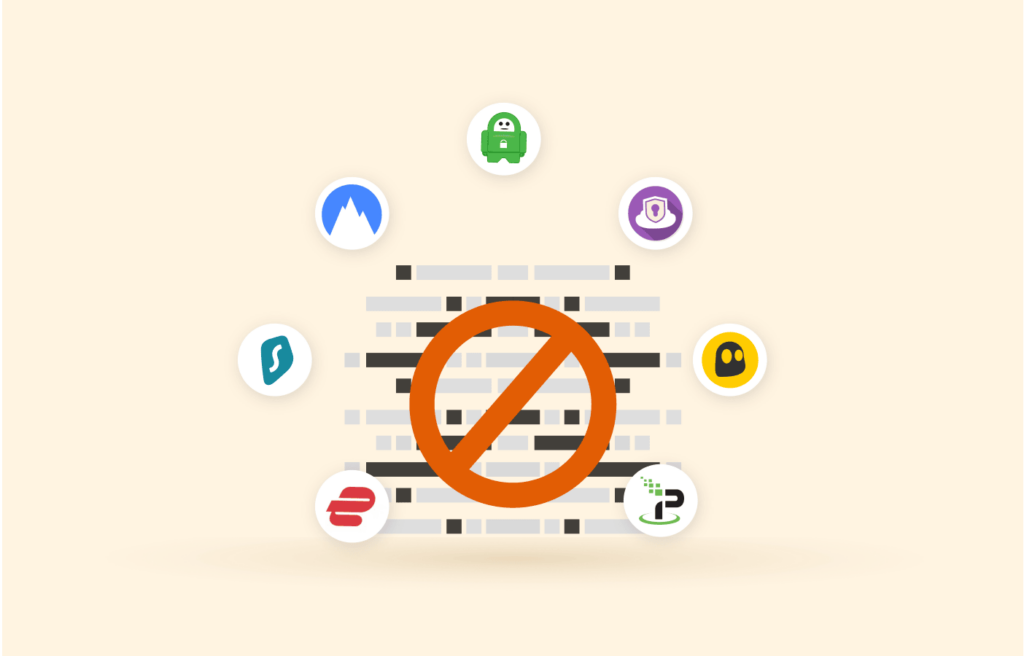
No. By encrypting your data, a VPN will only give you privacy, not anonymity. It is essential to differentiate between the two, as there is a fallacy that VPNs also provide anonymity. Despite having a strict no-logs policy, a VPN provider can begin to collect user logs at any time. Regrettably, most VPNs are not entirely candid about the information they keep.
A high-quality provider should offer top-level protection by preventing third parties from seeing your online activities. It will also keep you safe when torrenting if you accidentally download or share copyrighted material. However, you shouldn’t rely on a VPN to offer protection when committing a crime.
Look for a VPN with Tor compatibility to maintain your online privacy. The Tor browser is designed to offer online anonymity by passing your traffic through several relay nodes, making it extremely difficult to trace your online activities. Some VPN services, such as NordVPN, support the Onion over VPN setup.
Can a VPN provider turn on logging?
Regardless of how enthusiastic a service is about privacy, the VPN service provider can be forced to start keeping logs. No VPN operator will risk incarceration to protect against criminal activities. So, don’t use a VPN to do activities that may contravene the laws of your country.
Why do I need a no-logs policy?
The zero-logs policy is generally more about professionalism than an absolute assurance that it’ll keep you private. If a VPN promises stealthy protection, it should be designed in its core foundation. For instance, having a true no-logs policy is one way to maintain users’ privacy.
Keeping logs is the direct opposite of privacy. Therefore, a VPN that keeps any identifiable information cannot claim to maintain your privacy.
How do I know a VPN is not keeping logs?
It isn’t easy to verify whether a provider does not keep logs, so we’ll take providers at their word. However, some VPNs are going further by undergoing independent audits to set them apart from the rest. At PrivacySavvy, we hope such audits become widespread as they show transparency.
Read the privacy policies and terms of service (ToS)
Dig deeper into the VPN’s privacy policy and ToS before committing to a plan. Many VPNs will boldly declare a no-logs policy on their website but contradict the claims in the policy’s finer details.
Warrant canaries
Court orders and warranties that compel companies to submit customer details often come with gag orders. This prevents the company from notifying its customers that something is going wrong. Some VPNs, such as Surfshark, have a warrant canary to prevent this from happening.
A warrant canary is a method companies use to inform their customers about an impending court subpoena. However, it has to be up to date.
Jurisdiction and logging policies
When choosing a VPN, it is crucial to consider where the provider is legally based. The jurisdiction can affect your privacy, as the VPN has to abide by the country’s laws. For example, some countries have strict rules that can undermine your online security and privacy. Below, we discuss some of them in detail.
The United States
The US has austere data retention laws. It is the founding member of the 5 Eyes countries, which share intelligence information. Government agencies like the FBI can force companies to store and hand over user information.
For example, Lavabit was shut down after being forced to provide its email service’s encryption key. In another instance, Riseup, a secure email service, was compelled to surrender data to the FBI and given a gag order.
Australia
The Australian parliament recently passed a law that allows the government to access encrypted communications. In addition, all companies must collect customer information and submit it to security agencies and law enforcement.
The United Kingdom
The UK is slowly becoming the most surveilled country in the world. For example, the Investigatory Powers Act (Snoopers Charter) allows the GCHQ to snoop on your data. It also forces ISPs to log user information for twelve months.
Note: Some jurisdictions, such as the British Virgin Islands and Panama, are privacy-friendly. To be on the safe side, choose a VPN provider based in these countries.
VPNs with a history of logging
The no-logs policy should be the standard in the VPN industry. However, we discovered some VPNs keep usage and connection logs, so you should avoid them.
PureVPN
According to its privacy policy, the provider claims it does not keep user logs. On the contrary, the provider cooperated with authorities to reveal a user’s IP address and real location. It indicates that the VPN keeps identifiable information, although it can reliably unblock content.
HideMyAss (HMA)
HMA’s poor logging policy led to a Lulzsec hacker’s arrest. This VPN logs users’ data as the provider complies with a court order that requires it to hand over user information to the authorities. Yet, shockingly, it claims to observe a strict no-logs policy.
Hola
Hola markets itself as a VPN. But, in reality, it works as a peer-to-peer (P2P) network that routes traffic through other people’s devices instead of servers. Worst of all, it admits to storing users’ information. The company also sells free users’ bandwidth to paying customers.
VPNBook
Although VPNBook uses military-grade encryption, the privacy policy raises concerns. It clearly states that the provider collects IPs and connection stamps and deletes them every week. This data can reveal your online activities and IP address.
BolehVPN
BolehVPN claims that it does not keep browsing activity logs or connection details. However, we found an interesting caveat when we investigated its privacy policy: it turns logs on to identify suspicious users. As a result, it can get you into trouble if you are caught engaging in illegal activity.
FAQs
There is no entirely no-logs VPN. Most providers will store unidentifiable information such as data usage and connection timestamp. This data cannot be used to identify you or trace your browsing activities. Instead, providers use it to run operations and improve services. Therefore, you should only be concerned if your VPN keeps identifiable information like your IP address and the sites you visit. Luckily, the VPNs featured on this list have a no-logs policy. Some even support anonymous payments through cryptocurrency.
Your online activity logs are the ones you should be worried about. They include search queries, web history, etc., that can be used to monitor your activities. You should avoid any VPN that logs any of your identifiable information. The other log you should consider is the metadata, which includes your IP address, connection timestamp, and IP address of the server you connect to. The information can be used to identify you and trace your online activities. Besides, there are diagnostic logs, which are
Using a VPN is legal in most countries around the world. Not unless you live somewhere like China and Belarus, where you can get into hot waters using a VPN. These countries ban VPN usage and have heavy internet surveillance. That said, a VPN will not protect you from doing illegal activities, no matter where you live. It should be a way to maintain your online security and privacy, but not for unlawful purposes.
VPN isn’t a fool-proof anti-hacking solution. So, even when using a no-logs VPN, you may face a hacking attack. However, using a VPN minimizes the risk of such attacks via IP tracking since it masks your real IP. Moreover, it encrypts your data in transit, alleviating the sudden exposure of your sensitive details to prying eyes. However, it cannot protect you from cyber threats via other means, such as malware attacks or phishing.
